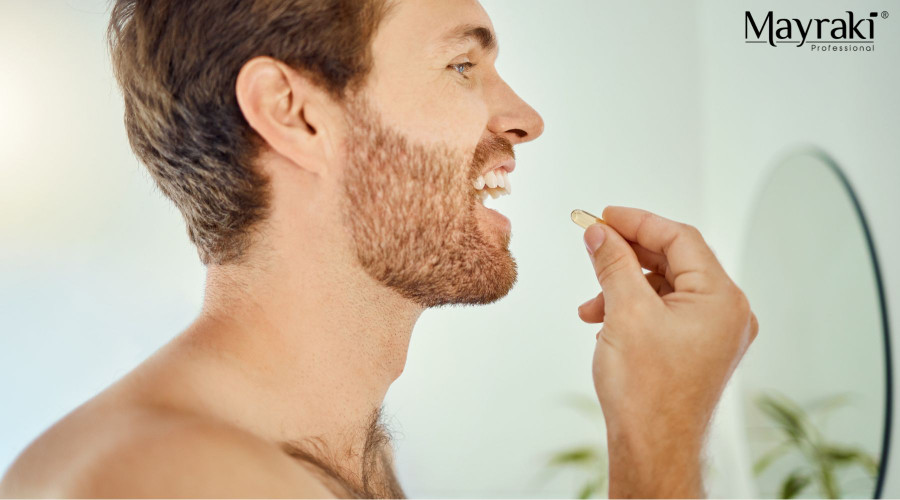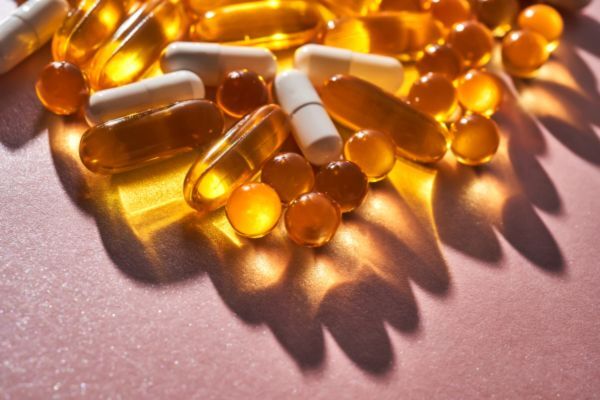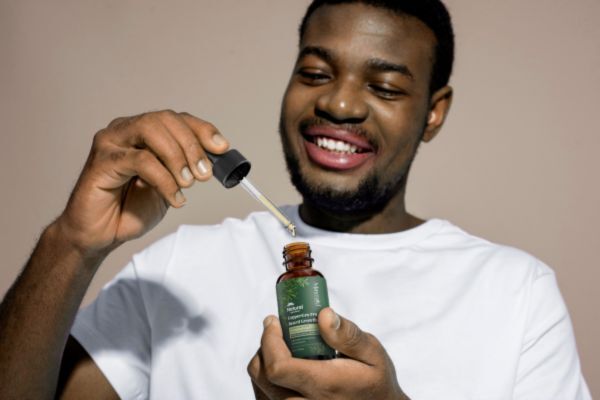How to Use Biotin Supplements for Beard Growth
Jun 28, 2025 | By Edss Tolentino

As the growing trend in beard care has arisen in recent years, more men have been turning to biotin supplements for beard growth to achieve a fuller, thicker beard. This growing interest has sparked numerous conversations online and within grooming communities. However, Biotin has gained a reputation as a miracle solution; it's essential to understand that its effectiveness largely depends on individual factors. Even then, results aren't instant; patience, consistency, and the right overall approach are key to seeing growing changes.
What is Biotin & Its Role in Hair Health
Biotin, also known as Vitamin B7, is a water-soluble B-vitamin that plays a vital role in maintaining the health of your hair, skin, and nails. It acts as a coenzyme in the production of keratin, which is the protein that makes up hair strands. That's why Biotin is commonly included in beard growth supplements and hair care routines. When it comes to us, Biotin for beard growth, the logic is simple: healthier hair follicles mean a better shot at fuller, stronger facial hair.
People with a biotin deficiency often experience issues like brittle hair, thinning, or even patchy spots, which has led many to explore the biotin hair patch as an alternative solution. While results vary depending on your health and genetics, many have reported improved beard thickness with Biotin after establishing a consistent supplement routine for beard care. If you're considering adding Biotin to your regimen, understanding the best biotin dosage for beard growth is crucial.
Most experts recommend starting with a moderate dose, ranging from 2,500 to 5,000 mcg daily. However, it's always wise to consult a healthcare professional first. The key to unlocking biotin benefits for facial hair lies in consistency, the correct dosage, and pairing it with a natural beard supplement that supports overall skin and follicle health.
Best Biotin Dosage for Beard

With the growing popularity of Biotin for promoting beard growth, many are exploring the world of beard growth supplements. Most men hope to achieve noticeable improvements in their facial hair. Howevert before you jump on the high-dose bandwagon, it's essential to understand the difference between standard intake and supplement-level dosage ass well asd what yourbody needs.
-
Standard Biotin Intake
For the average adult, the recommended daily intake of Biotin (also known as vitamin B7, which supports beard growth) is between 30 and 100 micrograms (µg). This amount is typically enough to support general health, including the maintenance of skin, nails, and hair.
-
Supplement-Level Biotin Dosages
Most supplement routines for beard growth go beyond the standard dose, ranging from 2,000 to 10,000 µg (or 2–10 mg) per day. These higher doses are marketed with promises of faster results and thicker beards, but do they work? Here's what to consider:
- Many users report improved beard thickness when taking Biotin at higher doses, especially when combined with a natural beard supplement rich in other essential nutrients, such as zinc and vitamin E.
- High-dose Biotin may help individuals with a biotin deficiency, which can contribute to patchy hair growth.
- Some products, such as the biotin hair patch, offer a convenient alternative for those who dislike taking pills.
-
Always Consult a Professional
Before jumping into high-dose supplements, especially at the 10,000 µglevel, it's crucial to:
- Consult with a healthcare provider to determine if you have a deficiency.
- Monitor for side effects, including possible interference with lab tests.
- Understand that even the best biotin dosage for beard growth won't yield results overnight; it takes time, consistency, and a well-rounded grooming plan.
Does Biotin Improve Beard Growth?
With all the buzz around Biotin, it's easy to think it's a magic f
ix for patchy or slow-growing facial hair. You've probably seen testimonials and product ads that make big promises, but how much of it is backed by science? Let's take a closer look at whether vitamin B7 for facial hair delivers results.
The Truth about Biotin Supplements for Beard Growth
Biotin (also known as vitamin B7) plays a key role in keratin production, which is essential for hair structure. It's not a one-size-fits-all solution. Here's what you need to know:
- Biotin only improves beard growth in those with a deficiency. You're lacking high doses, which necessarily speed up growth or fill in patches.
- A biotin deficiency can lead to hair loss, brittle strands, or poor quality facial hair, so correcting this deficiency can help.
- Many success stories are anecdotal, and current research doesn't strongly support biotin supplementation for beard growth in healthy individuals.
Marketing vs. Medical Facts
- Much of the hype is driven by supplement branding rather than clinical trials.
- Products boasting "he "perfect biotin beard d "ag" often lack scientific backing.
- Biotin is a water-soluble vitamin, meaning any excess typically leaves the body through urine; however, it doesn't make megadoses risk-free.
Potential Risks & Considerations
Before adding a safe biotin supplement to your routine, be aware of these factors:
- Biotin side effects are rare but may include skin rashes, digestive issues, or acne flare-ups in some people.
- It can cause lab test interference, especially in thyroid or heart tests, so always inform your doctor that you're taking it.
- A balanced diet is often more effective than popping pills.
Natural Sources of Biotin
Rather than relying solely on supplements, include biotin-rich foods in your diet to support overall hair health. Additionally, these dietary sources of Biotin not only nourish your beard from the inside out but also promote overall body health.
- Eggs (especially the yolk)
- Nuts and seeds
- Sweet potatoes
- Spinach and broccoli
- Whole grains
How to Use Biotin Responsibly

It's easy to get swept up in the hype of high-dose supplements and quick results. But responsible use is key, not just for your beard, but for your overall health. Biotin can be a valuable part of your supplement routine for beard care, but it should be approached with mindfulness and balance.
-
Start with Your Diet
Before reaching for beard growth supplements, take a look at what's already on your plate. Biotin naturally occurs in a variety of foods that can support hair health. Moreover, eggs, almonds, walnuts, salmon, sweet potatoes, and spinach are among the best natural sources of Biotin. These natural beard supplement sources are not only good for your beard but for your body as a whole.
-
Understand Proper Dosage
When it comes to the best biotin dosage for beard growth, it's not always the best. Start with the standard intake of 50–100 micrograms (µg) per day. Only increase to 2,000–5,000 µg if advised by a healthcare provider. Moreover, very high doses should be avoided unless correcting a diagnosed deficiency. This controlled approach helps minimize potential side effects while still reaping the benefits of Biotin for facial hair.
-
Timing and Consistency
Biotin is water-soluble, allowing it to be taken at any time of day, with or without food. For noticeable changes in beard thickness, allow at least 90 days for the hair follicles to respond. However, products like the biotin hair patch offer alternative delivery methods, but the timeline for results remains the same.
-
Communicate with Your Doctor
Letting your healthcare provider know you're taking it, especially before any lab work. PausBiotinotin should be used a few days before blood tests to avoid inaccurate results. Some lab tests, especially thyroid and cardiac markers, can be thrown off by high levels of Biotin in your system.
-
Balance and Patience
Whether you're using vitamin B7 for beard growth as part of a complete supplement routine for beard care or simply trying to boost patchy areas, remember that patience and balance are key. Start small, be consistent, and support your beard journey with both smart supplementation and a healthy diet.
Mayraki Beard Growth Oil and Biotin Supplements for Beard Growth

While biotin supplements for beard growth can play a helpful role in your journey toward a fuller, healthier beard, they are most effective when combined with proper grooming habits, nourishing oils, and effective stress management. This is where Mayraki CopperGro Pro Beard Growth Oil comes in. It is a natural companion to your supplement routine that supports your beard from the outside in.
This lightweight, fast-absorbing oil is designed to condition your beard, hydrate the skin beneath, and promote stronger, more resilient hair strands. When used consistently, it can amplify the effects of your supplements by creating the ideal environment for hair growth.
Wrap-Up
While biotin supplements for beard growth can support healthier facial hair, especially in cases of deficiency, they're not a quick-fix solution or miracle cure. The key is to use them wisely as part of a balanced grooming routine that includes proper skincare, a balanced diet, and consistent care. Be patient, track your progress over time, and focus on creating the right environment for your beard to thrive. With the right approach, you'll be giving your beard the best chance to grow strong, complete, and healthy.




